The power of Honey
Edited on
11 September 2020The Municipality of Amarante, one of the most beautiful and “sweet” cities of Portugal, is a destination in the north of the country. It is recognized for its honey in varieties such as heather, rosemary, eucalyptus or orange which is so special, that it is labelled with the EU Protected geographical indication. Originating from traditional use of honey in the culinary field and due to locals with dreams and visions, who joined small beekeepers and developed their business, local honey and diverse products made with honey or other bee products are distributed across the country and abroad. Today, beekeeping is a growing sector of the local industry especially important for the rural areas.
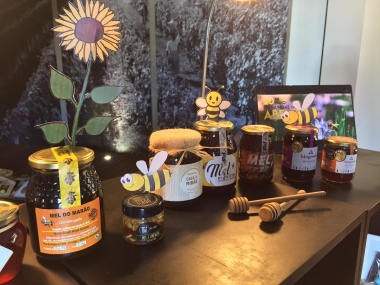
![]()
Read the article in any of the other 6 languages:
![]() Download Article on New Products GR (1.14 MB)
Download Article on New Products GR (1.14 MB)![]() Download Article on New Products HU (1.31 MB)
Download Article on New Products HU (1.31 MB)![]() Download Article on New Products IT (1.14 MB)
Download Article on New Products IT (1.14 MB)![]() Download Article on New Products PL (1.31 MB)
Download Article on New Products PL (1.31 MB)![]() Download Article on New Products PT (1.07 MB)
Download Article on New Products PT (1.07 MB)![]() Download Article on New Products SI (1.28 MB)
Download Article on New Products SI (1.28 MB)
![]()
Honey bread – in Portuguese Broa de mel is a Portuguese musical duet that became famous in the 80s and 90s with their love songs performed in several festivals such as the Festival RTP da Canção. Their songs talked about passion, ardour, union, romance, breezes, caresses and about “honeymoons”. These sweet themes which refer to happiness and wellbeing can make us feel honey.
The name of the group as well as their song lyrics are deeply connected with “broa de mel” a well-known Portuguese sweet made in many bakeries and pastry. Honey is commonly used in Portuguese confectionary in typical sweets such as “ginger and honey cake”, “honey and cinnamon cake”, “honey bread with egg cream filling”, “cake of olive oil and honey with cinnamon and nuts"," Algarvian honey cake "," honey and yogurt cake" and "honey and raisin cake" or "honey toast".
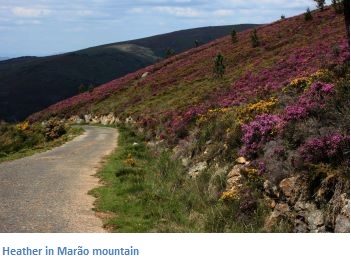 Honey is an important ingredient in healthy meals and is a part of a diet of many citizens. For instance Arménio Miranda (74 years) eats a soup plate and a piece of bread with honey for breakfast since he can remember. He says that this reflects on his physical balance and wellbeing and helps him fight flue, hoarseness and headaches.
Honey is an important ingredient in healthy meals and is a part of a diet of many citizens. For instance Arménio Miranda (74 years) eats a soup plate and a piece of bread with honey for breakfast since he can remember. He says that this reflects on his physical balance and wellbeing and helps him fight flue, hoarseness and headaches.
Arménio Miranda, born and raised in Serra do Marão, used to produce around four tonnes of heather honey per year. Today his production is meant only for personal use though he preserved the ritual of giving jars of honey to his friends for their birthdays – a valuable gift as well as a promotion of honey.
Honey has countless uses; from gastronomy to cosmetics, health and wellness…. or as a unique product. Increased demand for such products plays an important role in the local economy, as recognized by Alexandre Vieira, current president of 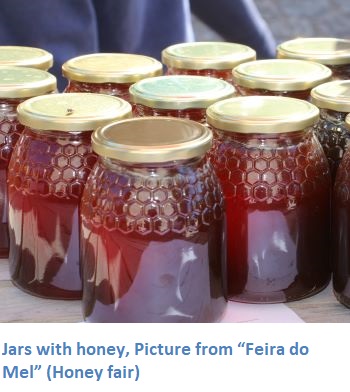 Apimarão (Association of Beekeepers of Marão and Aboboreira), an association that brings together about 50 beekeepers. He is committed to making Apimarão more dynamic and through the association create logistical conditions that facilitate the work of honey producers, whether in terms of extraction or commercialization. “Instead of each beekeeper using his garage to extract the honey, we want to gather equipment in one place, and put it at the service of members, so they will have adequate technical and sanitary conditions”, says Alexandre Vieira.
Apimarão (Association of Beekeepers of Marão and Aboboreira), an association that brings together about 50 beekeepers. He is committed to making Apimarão more dynamic and through the association create logistical conditions that facilitate the work of honey producers, whether in terms of extraction or commercialization. “Instead of each beekeeper using his garage to extract the honey, we want to gather equipment in one place, and put it at the service of members, so they will have adequate technical and sanitary conditions”, says Alexandre Vieira.
A forest engineer, and also a beekeeper himself, Alexandre Vieira sells pollen to tearooms, pastry shops or pharmacies but above all he is committed to the design and building of beehives. He produces apiaries regardless of size even small ones meant for self-consumption.
The mountains of Marão and Aboboreira and the slopes of the river Ovelha have flora of heather, rosemary, eucalyptus and orange blossoms. Honey produced there is a very special EU food product which has the EU label “Protected geographical indication (PGI).
The (profitable) passion for bees
Working with bees, producing honey, is more than a business, it is a passion! In the spring of 1985, a swarm entered the house of Alexandre Morais (61 years old) through a window and hid between the foundations of the house and the wooden floor. His friend, a beekeeper, transferred the bees to a hive. Fascinated by what he saw he started to learn about beekeeping and shortly thereafter he had 40 hives. Circumstances forced him to abandon beekeeping but he believed that he will return when conditions for professional and continuous work will be met. Later he graduated at the University of Trás-os-Montes and Alto Douro and soon after he owned 200 hives in 9 apiaries and produced 3 tonnes of honey annually to sell on the market. Shortly after that he expanded his business to the United Kingdom with the support of a local distributor. He then started to buy honey from other producers from all over the country and so acquired mono-floral honeys such as rosemary, orange, chestnut and other varieties that the market requests. This honey is processed and packed in a honey factory in Vila Meã, licensed by the Regional Agriculture Directorate, for processing and packaging honey.
The Dolmen store (Cooperative for Local and Regional Development) in Amarante is an excellent point of sale and promotion. Crucial to their business development is participation at national fairs such as the honey fair in Aboadela, the Duquesa fair in Guimarães, the fair of the hypermarket Continente, the National Honey Fair as well as the Achéres fair in France, the region with a large Portuguese community.
The drink of the Gods
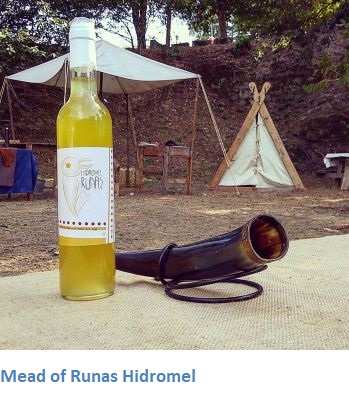 Tiago Morais, a professional firefighter and professed admirer of Nordic cultures, fulfilled his great passion for mead by producing it. Encouraged by positive feedback from friends, he first started to produce this “drink of the gods” for family and friends at festive times. Due to the increased demand he saw a business opportunity and established a business named Runas Hidromel (Mead) installed at the Instituto Empresarial do Tâmega.
Tiago Morais, a professional firefighter and professed admirer of Nordic cultures, fulfilled his great passion for mead by producing it. Encouraged by positive feedback from friends, he first started to produce this “drink of the gods” for family and friends at festive times. Due to the increased demand he saw a business opportunity and established a business named Runas Hidromel (Mead) installed at the Instituto Empresarial do Tâmega.
“Runas mead is a 100% national product, uses honey from Portuguese producers, mainly from the north, thus guaranteeing its quality”, he ensures and explains that mead “is a product made with water, honey and yeast, with an average fermentation time of 1 to 3 months, to reach alcohol content between 6% to 11%. This time can be longer, depending on the type of mead desired. After fermentation, the mead is filtered to achieve its characteristic colour and also undergoes a pasteurization process.
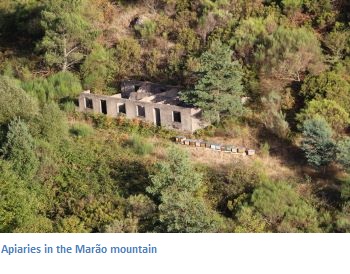 Runas mead is sold in bottles or in barrels, with added gas, for bars, restaurants and street vendors. At the online store Runas Hidromel mead can be purchased in its traditional formula or in a variety of flavours. Tiago highlights “the red fruit mead, perfect for the height of summer and ideal for cocktails; blueberry mead, similar to a wine in its acidity; fennel mead, the one that you either like or dislike and the coffee mead thought of as digestive”.
Runas mead is sold in bottles or in barrels, with added gas, for bars, restaurants and street vendors. At the online store Runas Hidromel mead can be purchased in its traditional formula or in a variety of flavours. Tiago highlights “the red fruit mead, perfect for the height of summer and ideal for cocktails; blueberry mead, similar to a wine in its acidity; fennel mead, the one that you either like or dislike and the coffee mead thought of as digestive”.
Runas Hidromel operates since 2012. They annually produce 10,000 litres of mead for which they need four tonnes of honey. The company mainly focuses on the national market where they control 50 % of it. Its main selling channels are medieval fairs and restaurants.
Honey as a tourist product
The importance of beekeeping in Amarante and being a part of BeePathNet reflects in the development of local tourism. Inside Experiences, a local tour operator, created two routes / tours to provide tourists with the honey experience. The first is a jeep tour on the mountain (Marão), where the oldest sites connected to the installation of hives are visited, presenting the entire history of beekeeping and honey production over time, ending the tour with a picnic where honey products are served. Within the second you will visit a local producer, do his job for a day, which includes the routine of taking care of the apiaries and the honey extraction itself, whenever possible. It includes tasting of food and sweets with honey.
“Other extraordinary experiences, full of unforgettable memories and moments of pure harmony with nature and history.” and “Sharing these memories with others will allow us to relive the traditions, cuisine and landmarks that define and preserve the history of Amarante, one of the most beautiful cities in Portugal” said João Ribeiro and Liliana Pereira, company representatives.
Another tourist agency Stay to Talk also has two tourist programs related to honey. One of them is based on a mead workshop and the other one named “Melissa and mead time” will take you through time to the beginning of the use of honey.
Nicolau Ribeiro (Municipality of Amarante)
Author of photos 1, 2 and 4: Nicolau Ribeiro; photo 3: Runas Hidromel
 Submitted by v.erhart on
Submitted by v.erhart on
